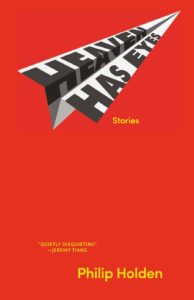World War II birthed the anti-colonial Indian National Army (INA), a force composed of former imperial troops and civilian recruits that fought with Japan against the British and helped to accelerate India’s independence from Great Britain. Like most aspects of World War II, these developments were messy, complicated, and filled with tragedy. Gautam Hazarika, a former banker turned World War II historian, tells the story of one of the war’s lesser-known tragedies—the fate of Indian prisoners of war in the aftermath of Japan’s conquest of Malaya and Singapore.
Singapore

Set in Singapore, Vancouver, London, and the spaces in between, the short stories in Heaven Has Eyes offer an imaginative, penetrating look at the complexities of migration, belonging, and a desire to find a home in the world.
On 9 August 1965, Singapore was expelled from Malaysia, which had itself only become an independent country two years earlier. But Malaysia insisted that Malaysian troops be permitted to remain in Singapore. Singapore’s future Prime Minister Lee Kwan Yew later said that Malaysia’s insistence “stiffened our resolve” to “build up the Singapore Armed Forces”. The person primarily responsible for doing that is the subject of Ramachandran Menon’s new book Kirpa Ram Vij: The Volunteer Who Launched an Army.
Genevieve Yang, the protagonist of Jemimah Wei’s debut novel The Original Daughter works a dead-end job in Singapore, living in the shadow of her adopted younger sister, Arin, a rising movie star. Genevieve’s dying mother asks her to call Arin; Genevieve refuses.

This book tells the inside story of how Singapore defied considerable odds to develop a dynamic economy and cohesive society in the 60 years since the city-state’s independence.
Through in-depth interviews with some of the nation’s most influential leaders—Abdullah Tarmugi, Chan Sek Keong, Cheong Koon Hean, Halimah Yacob, Peter Ho, Khaw Boon Wan, Lim Siong Guan, Ravi Menon, Seah Jiak Choo, Tan Yong Soon, Eddie Teo, Teo Ming Kian—How Singapore Beat the Odds explores various facets of public policy that shaped Singapore’s remarkable transformation.
Nine years in the making, Jemimah Wei’s debut novel is a complicated story of two sisters who found and lost each other amidst the busy, urban, competitive island of Singapore. It provides a glimpse of Singapore without the glitz and glamour, a Singapore in which the expectation of excellence drives a wedge through even the strongest bonds of sisterhood.

Best known in Singapore as the writer and performer of the smash-hit comedy album “Why U So like dat?’, Siva Choy was a multi-talented musician, journalist, stand-up comedian, movie actor and teacher. An intimate and revealing new book paints an affectionate portrait of a life filled with pioneering artistic endeavour.
Singaporean debut author Malcom Seah is a writer of originality, scope and ambition, who is unafraid to take on challenging issues, ranging from eating disorders, to sexual abuse, to the complexities of coming out in a conservative society. He is skilled at plotting, marrying his intricate and intriguing plot with elements of experimental fiction.
Kishore Mahbubani, longtime Singaporean diplomat and academic, opens his new memoir with a provocative line: “Blame it on the damn British.” Kishore, who later served as Singapore’s ambassador to the UN and founding dean of the Lee Kuan Yew School of Public Policy, was born to poor migrants in Singapore, studied philosophy on a government scholarship—and from there, somehow got roped into the foreign service.
For two decades, Singaporean diplomat and author Kishore Mahbubani has been a leading voice among a growing group of intellectuals and pundits publicizing the “Asian Twenty-First Century”, a triumphalist arc where Asian powers—especially a rising China—have cast off the shackles of Western colonialism to assume their “rightful” place atop in the global hierarchy of nations and civilizations. Mahbubani’s oeuvre, dominated by his series of bestsellers popularizing a tale of Western decline and Asia’s rise, has won recognition from a host of audiences ranging from American internationalists and Chinese nationalists.

You must be logged in to post a comment.